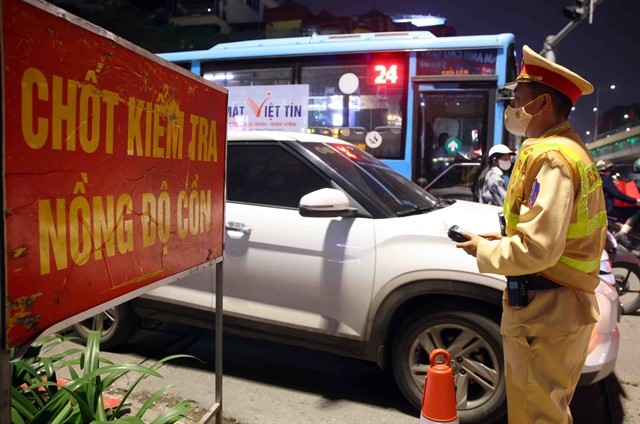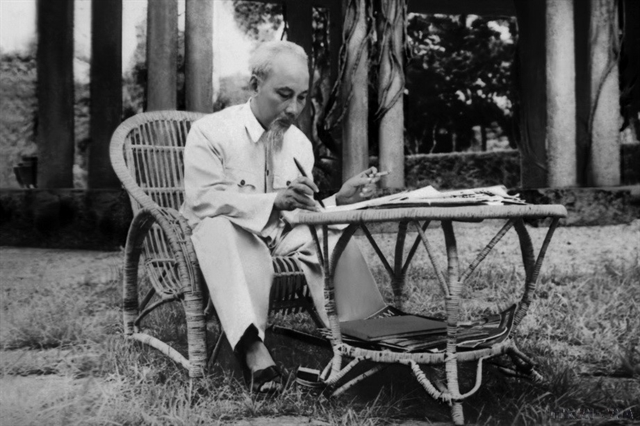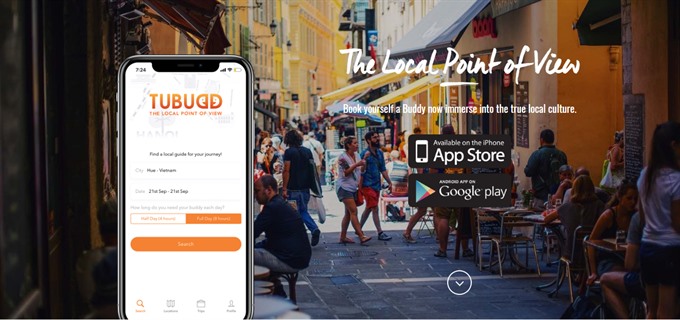 Society
Society

Young Vietnamese tourism businesses are making use of technology in the digital era to connect resources and create innovative products.
 |
| Tubudd’s website. Like searching for hotels on booking platforms, on Tubudd’s website and app, travellers can look for local guides who match their travel needs and budgets through a few simple clicks. - VNS Photo Khánh Dương |
Khánh Dương
HÀ NỘI — What’s the best way to explore a city from a local point of view?
For Vũ Thái An, the CEO of a tourism start-up, it’s travelling with local people.
About five years ago before starting her masters in Manchester, An took a tour around Việt Nam as a backpacker with two Canadian friends. During the trip, she realised there was a market for helping foreign backpackers to avoid tourist traps and experience true Vietnamese life.
Most tours and individual trips don’t offer this experience and cost more than necessary with restricted schedules.
An nurtured the dream of connecting foreign tourists with locals in Việt Nam while she was completing her master’s degree, and when she returned a year ago, she made that dream a reality with Vietnamese and British friends by setting up Tubudd, a digital platform connecting travellers and local people.
Like searching for hotels on booking platforms, travellers can find local tour guides on Tubudd’s website and app, known as ‘buddies’, who meet their travel interests and budgets through a few simple clicks.
Each buddy profile gives tourists a brief introduction of the guides and their ratings.
Buddies are not required to be professional tour guides but must pass strict selection rounds with the two most important criteria being a foreign language and knowledge of the city they are from.
A lot of young people across Việt Nam who are passionate about travelling and willing to show their country to visitors have become buddies. Now Tubudd has a network of over 400 buddies across 15 provinces and cities.
“Many young people in Việt Nam are good at foreign languages but don’t have the environment to practise what they have learned. Tubudd offers them opportunities to earn extra money while at the same time sharpening their foreign language skills,” An said.
An estimates that foreign tourists travelling with local guides can save up to 80 per cent of the costs compared to how much they would spend on package tours or self-travel.
According to An, her start-up’s advantage is technology, following a trend in which traditional tourism is switching to technological tourism.
However, the 27-year-old entrepreneur does not want tourists to rely too much on technology.
“Now in the technology era, travellers depend on GPS and Google to search for tourism information. Technology is replacing people. I want to make use of technology to connect people. I want tourists to put their smartphones and internet aside and have direct contact with other people to get to know about local customs,” she said.
Connecting resources
Taking advantage of technology to develop products is an emerging trend that tourism start-ups are following to bring into full play the potential of Vietnamese tourism.
There is an increasingly high demand for online flight and hotel bookings in Việt Nam. Many travellers, especially young people, prefer planning their trips by themselves rather than asking for help from travel agents or booking a tour with restricted schedules. When there is demand, here comes the supply.
Young Vietnamese tourism businesses are making use of technology in the digital era and learning how to connect resources together to create innovative tourism products.
Partnering with airlines and hotels, Tago gives tourists a variety of options for holiday packages each of which consists of a flight ticket and hotel at the best prices.
After booking their trip on Tago’s website, tourists can decide on their plans by themselves without being restricted to a scheduled tour.
This “free and easy” trend has become dominant across the world and recently gained in popularity among Vietnamese travellers.
“Tago envisions changing the way Vietnamese people book their trips. Instead of searching for flight tickets and hotel rooms on separate websites, they can find everything they need in one place. It is convenient, time-saving and gives customers better prices than booking each service separately,” Trịnh Đình Minh, Tago founder and CEO, said.
Minh believes that technology could help boost the efficiency of the tourism sector by two to three times.
“When tourism efficiency improves, it unlocks hidden potential,” he said.
"Global online travel agencies (OTAs) now dominate Việt Nam’s online market. Vietnamese OTAs need to develop their business models to compete with international OTAs and protect the domestic market," Minh said.
Lý Đình Quân, founder and CEO of Sông Hàn Incubator and a specialist in entrepreneurship eco-systems, said: “The advantage of tourism start-ups is not only technology but also innovative ideas.”
“Innovation in starting up a business is using intelligence to exploit resources. Việt Nam’s tourism resources are immense – human resources, festivals, history and nature. Tourism start-ups know how to take advantage of these resources and turn them into a profit with the assistance of technology,” he said.
“But start-ups should not depend too heavily on technology and should, at first, make use of creativity to exploit these resources,” he said.
Việt Nam has a variety of local tourism products but why have many of them not been introduced to the world? The reason is our resources are unconnected.
“Vietnamese tourism start-ups are connecting resources to create streamlined packages,” he said.
“I believe that new start-ups that applying technology combined with traditional tourism products will help the country’s tourism industry soar,” he said. — VNS




